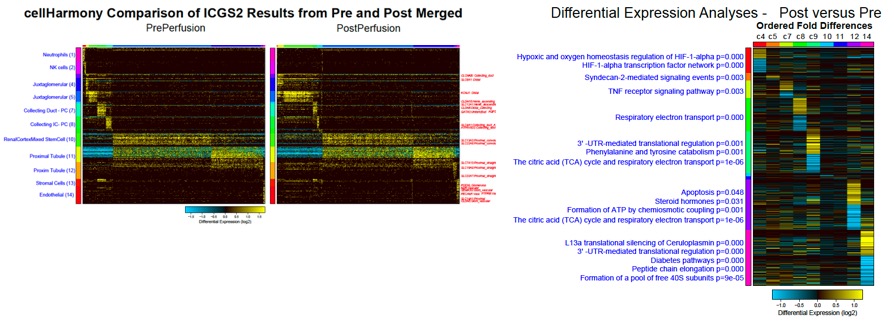Immediate Post Reperfusion In Vivo Transcriptional Responses of Individual Human Renal Allograft Cell Populations to Circulating Anti-Angiotensin II Type I Receptor Antibody
1Immunobiology, Cincinnati Children's Hospital, Cincinnati, OH, 2Biomedical Informatics, Cincinnati Children's Hospital, Cincinnati, OH, 3Transplantation, University of Cincinnati College of Medicine, Cincinnati, OH
Meeting: 2019 American Transplant Congress
Abstract number: D107
Keywords: Alloantibodies, Kidney transplantation, Rejection
Session Information
Session Name: Poster Session D: Kidney Acute Antibody Mediated Rejection
Session Type: Poster Session
Date: Tuesday, June 4, 2019
Session Time: 6:00pm-7:00pm
 Presentation Time: 6:00pm-7:00pm
Presentation Time: 6:00pm-7:00pm
Location: Hall C & D
*Purpose: Pre-existing anti-angiotensin II type I receptor (AT1R) antibodies can be a significant driver of allograft rejection. Indeed, prior work has shown that AT1R antibodies are associated with increased damage to vascular endothelium and increased pro-inflammatory cytokine production. However, the early cellular responses to AT1R antibodies within the allograft are unknown.
*Methods: Here, we analyzed the early transcriptional response to AT1R antibodies using single cell RNA sequencing (scRNAseq). Specifically, we obtained a biopsy immediately before and one hour following renal allograft reperfusion at the time of transplantation in a patient with high levels of pre-existing anti-AT1R antibody. Renal allograft biopsies were digested at 4 degrees using a novel cold active protease protocol to minimize hypoxia-induced gene expression artifacts. Single cell-based cDNA libraries were constructed using the 10x genomics platform.
*Results: Unsupervised bioinformatics analysis revealed the presence of >12 distinct cell types in both pre and post reperfusion biopsies. Using a novel single cell bioinformatics tool (CellHarmony) we found that gene expression levels within each cell population changed substantially within an hour of transplantation. Notably, we observed (i) an increased HIF-1α signature within a subset of juxtaglomerular cells; (ii) evidence of TNFRα signaling within collecting duct cells; (iii) altered respiratory metabolism in collecting duct intercalating cells and proximal tubule cells; and (iv) altered gene transcription machinery within glomerular endothelial cells.
*Conclusions: These data demonstrate that individual cell populations within the kidney allograft exhibit rapid and distinct gene expression alterations in the presence of pre-existing AT1R antibodies. This experience highlights the substantial power of single cell genomics approaches toward dissection of the complex cellular responses to preformed antibody in vivo in human kidney transplant recipients.
To cite this abstract in AMA style:
-Rojas CMCastro, Salomonis N, Chetal K, Alloway RR, Woodle E, Hildeman DA. Immediate Post Reperfusion In Vivo Transcriptional Responses of Individual Human Renal Allograft Cell Populations to Circulating Anti-Angiotensin II Type I Receptor Antibody [abstract]. Am J Transplant. 2019; 19 (suppl 3). https://atcmeetingabstracts.com/abstract/immediate-post-reperfusion-in-vivo-transcriptional-responses-of-individual-human-renal-allograft-cell-populations-to-circulating-anti-angiotensin-ii-type-i-receptor-antibody/. Accessed February 19, 2026.« Back to 2019 American Transplant Congress

